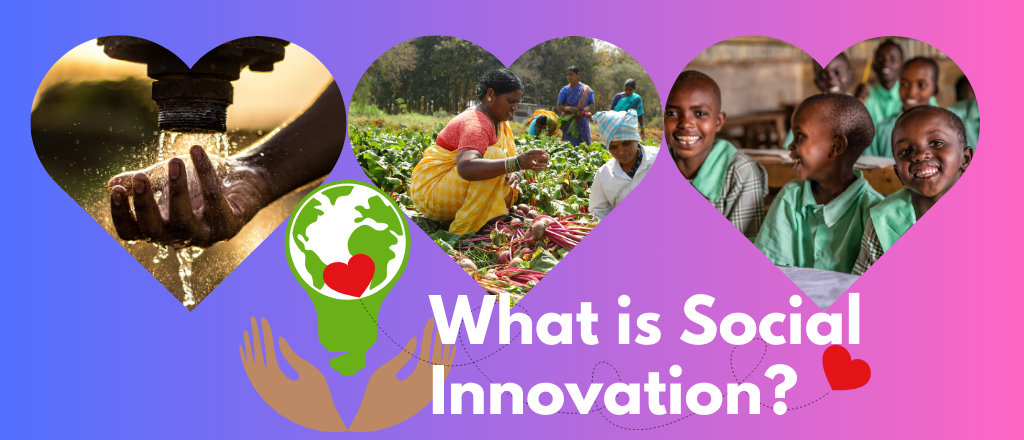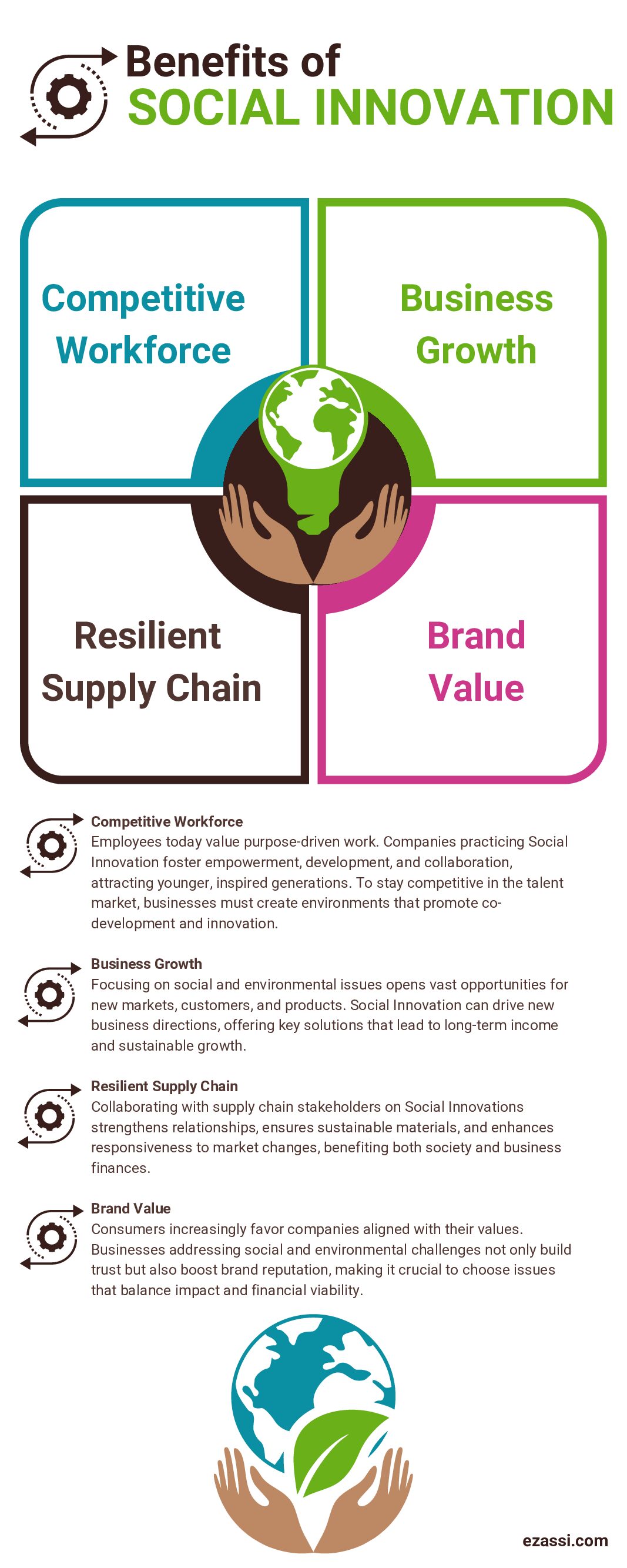What is Social Innovation?
Social Innovation refers to the creation of new solutions—ideas, services, or models—that meet pressing social needs and improve individuals’ and communities’ quality of life. Unlike conventional innovations focused primarily on profit, Social Innovations aim to create shared value, addressing complex challenges such as poverty, health, education, and environmental sustainability.
Notably, in 2023, the United Nations General Assembly formally recognized Social Innovation’s contributions to sustainable development, underscoring its relevance in today’s interconnected world. The jury is still out on the greatest social innovation of all time; is it the wheel, the social innovation that got the human race rolling, facilitating trade and spreading ideas and wealth globally, or is it the tax system which allowed the creation of public service the (theoretical) equal distribution of wealth? The internet gets my vote, for its substantial social impact in a relatively short period. In less than 50 years the world wide web has profoundly impacted and reshaped society, transforming how we communicate, work and engage within one another. As a business Social Innovation can provide opportunities for you to stand out from your competitors by creating long-term strategies to address social problems.
CSI vs. CSR: Understanding the Distinction
While “Social Innovation” captures the imaginative spirit of solving social challenges, you’ll often see two key terms in the business world: Corporate Social Innovation (CSI) and Corporate Social Responsibility (CSR). It’s all a bit of alphabet soup, so let’s break down how these notions differ—and why it matters.
Corporate Social Innovation (CSI)
CSI is about weaving social innovation directly into the fabric of a company’s business. Rather than treating social good as a side gig or one-off project, CSI encourages businesses to continuously develop new ways to address social issues—health, education, climate change, you name it—right within their core activities. Picture it as an ongoing journey, with companies always seeking ways to improve communities as part of “how business gets done,” not just as an extra.
Corporate Social Responsibility (CSR)
CSR, on the other hand, is the traditional elder statesperson of the group. It refers to a company’s efforts to operate ethically by giving back—think philanthropy, volunteering, eco-friendly policies, and supporting human rights. CSR usually focuses on four main pillars:
- Charitable giving and community involvement
- Environmental stewardship
- Fair treatment of employees and partners
- Honest economic practices
Often, CSR programs address the symptoms: donations, cleanup days, or annual charity events. Admirable? Absolutely. But these efforts sometimes skim the surface, rather than tackling the deeper causes of systemic issues.
Digging Deeper: Why Does It Matter?
The key distinction is all about intent and integration. While CSR asks, “How can we be responsible while doing business?” CSI challenges, “How can our business itself become a force for genuine, lasting change?” CSI demands companies roll up their sleeves and work on root causes, not just bandage the symptoms.
Think of it like gardening: CSR sprinkles fertilizer on the leaves, but CSI gets its hands dirty to improve the soil itself—creating long-term growth, not just a temporary bloom.
In today’s ever-evolving business landscape, this shift from CSR to CSI is gaining traction—not just as a moral imperative, but as a business opportunity. Companies that embrace CSI often find themselves ahead of the curve, building resilient communities and creating shared value for everyone involved.
Global Megatrends Fueling the Need for Social Innovation
Social innovation rarely emerges from a vacuum; it’s often propelled by sweeping global shifts—what you might call “megatrends”—that are transforming the fabric of our societies. Let’s unpack some of these drivers and see why social innovation is suddenly the buzzword you can’t ignore at the boardroom table.
Urbanization: Cities on the Move
First up: urbanization. The world’s cities are swelled by millions every year, not only by opportunity-seekers but also by the forcibly displaced—over 80 million and rising. This influx dramatically reshapes urban life, creating an urgent need for fresh approaches to housing, education, and social integration. The era of “smart cities” isn’t just about whiz-bang technology anymore—it’s about reimagining city life with people at the core. More inclusive cities have been shown time and again to outperform others, both socially and economically, by tailoring services to the diverse realities of their populations.
Health and Wellness: Prevention Over Cure
The healthcare megatrend is more than just headlines about ageing populations and post-pandemic stress. For many countries, half the population now battles a chronic condition, and healthcare spending is ballooning accordingly. Innovative responses are required—not just to treat disease, but to prevent it in the first place. Companies are pioneering ways to manage everything from diabetes to obesity by focusing on behavioral change, digital health, and continuous care, redefining what we expect from our health systems.
Happiness, Well-Being, and Economic Growth
Interestingly, even as the global GDP climbs, happiness doesn’t always tag along for the ride. Recent research, including perennial data from the World Happiness Report, confirms what most of us already suspect: true prosperity needs more than just financial gains. The happiest nations, such as Finland, the Netherlands, and Switzerland, consistently blend economic dynamism with a high degree of social well-being and innovation. Social innovators are now zeroing in on ways to promote well-being—through mindfulness, community, or workplace wellness—because happier people tend to be more engaged, productive, and loyal.
Climate Change: Innovation for a Hotter World
And of course, there’s the looming elephant in every discussion: climate change. With carbon emissions rising and extreme weather events growing ever more frequent, our cities, transport networks, and food systems face a dramatic overhaul. Social innovation here is booming, from the rise of electric vehicles to the popularity of plant-based alternatives like Beyond Meat, and tools that empower individuals to track and reduce their own carbon footprints. The future, it turns out, is not just climate-friendly—it’s innovation-driven at every level.
These megatrends don’t simply disrupt—they create fertile ground for new ideas that serve both society and business interests. The pressing needs and epic scale of these challenges invite creative problem-solvers to make their mark, driving social innovation into the heart of the global agenda.
GDP, Happiness, and the Role of Social Innovation
It’s easy to assume that if a nation’s GDP is going up, so too must the happiness of its people. Yet, the data tells a more interesting story. Some of the world’s happiest countries—think Finland, Denmark, and the Netherlands—aren’t just economic powerhouses. They consistently top both innovation and well-being charts, showing there’s more to prosperity than just dollars and cents.
Here’s the twist: economic growth alone doesn’t guarantee happier or healthier citizens. China, for instance, boasts the world’s second-highest GDP, but it doesn’t rank nearly as high when it comes to overall life satisfaction or social prosperity. This disconnect suggests that, while money matters, true flourishing depends on something more holistic.
That “something more” is often fueled by social innovation. When communities and organizations invest in solutions that improve social well-being—like better healthcare access, educational opportunities, and inclusive civic systems—people tend to feel more fulfilled and content. This isn’t just a feel-good factor; research shows that societies prioritizing social innovation enjoy higher happiness scores and a greater sense of collective purpose.
More companies are catching on to this, too. Take, for example, firms like Calm, whose mission goes beyond profit margins to address mental wellness on a global scale. By placing social well-being front and center, these businesses are redefining what it means to succeed—not only in dollars, but also in quality of life for individuals and communities.
As you consider your own organization’s role, remember: contributing to genuine happiness often means looking beyond GDP and embracing social innovation as a core value.
The Big Business Opportunity of Social Innovation
Why Social Innovation Outpaces Traditional Philanthropy
It’s tempting to lump social innovation together with old-school charity, but the comparison sells short its true potential. In reality, social innovation goes well beyond writing a check to a worthy cause; it’s a catalyst for lasting change—both for society and your bottom line.
Let’s break it down:
- Corporate Social Responsibility (CSR): This has been the go-to playbook for decades. Think well-intentioned donations, tree-planting photo ops, and annual reports touting ethical supply chains. While it feels good and polishes brand image, CSR often focuses on easing symptoms rather than solving root issues. The result? Goodwill that’s fleeting and initiatives that sometimes struggle to make a tangible impact.
- Corporate Social Innovation (CSI): Here’s where the magic happens. Instead of separating out “doing good” as an afterthought, social innovation weaves it into the fabric of business. Companies spot opportunities where market needs and social needs overlap, using the same creativity and persistence that drive their commercial growth to tackle real-world challenges.
Why is this approach more effective? Because social innovation:
- Targets the Source: Rather than just treating symptoms—be it poverty, environmental issues, or education gaps—social innovation digs deep to uncover (and address) the underlying causes.
- Delivers Lasting Solutions: With continuous improvement baked in, social innovation leads to better, more sustainable outcomes for communities and companies alike.
- Strengthens Business: Instead of being a cost center, social innovation opens new markets, inspires loyalty, and fuels growth—offering a double win.
Put simply, while philanthropy is a handout, social innovation is a hand up—for both society and business. Solving root problems proves far more valuable, transforming responsibility from a checkbox into a game-changer.
Social Innovation serves as a powerful motivator for employees. In a competitive talent landscape where attracting top-tier professionals is becoming increasingly costly, a company’s commitment to Social Innovation can enhance employees’ sense of purpose and make the organization more attractive to potential candidates. Involvement with Social Innovation can impact an employee’s sense of purpose and can make your organization seem appealing to candidates. Employees who feel their efforts contribute to meaningful social initiatives are also more likely to stay engaged and remain with the organization.
But the benefits of Social Innovation run deeper than employee motivation. Organizations that actively seek out new, underserved markets—whether locally or in emerging economies—often uncover significant growth opportunities that go beyond the traditional scramble for market share. Instead of jostling in crowded fields, forward-thinking companies spot and serve unmet needs, sometimes addressing problems that have lingered unaddressed by the public or non-profit sector.
A compelling example is Grameen Danone’s approach in Bangladesh, where more than half of preschool children suffer from malnutrition. By developing fortified yogurt products and innovative packaging like the Shokti Pocket (a carton pouch made of local grains and stored at room temperature), they tapped into a previously overlooked market segment. This kind of social innovation doesn’t just drive positive social outcomes—it opens up entirely new consumer bases and can transform business models. Leveraging micro-factories powered by renewable energy, such companies demonstrate how capital development and social good can go hand in hand, even in so-called “unattractive” or low-income markets.
Genuine Social Innovation fosters a culture of sustainability vital for company survival and growth. As global attention on Environmental, Social, and Governance (ESG) standards intensifies, social innovation strengthens relationships with stakeholders, builds credibility, and elevates a company’s brand. The power of online communities has been unleashed on brands who have failed on social issues. The force of social media has punished these missteps resulting in bottom line impact. In 2021 Burger King faced substantial backlash for tweeting, “Women belong in the Kitchen” on International Women’s Day. The tweet was intended to promote a scholarship program for female employees to raise awareness of the lack of gender diversity in the restaurant industry, but there was widespread criticism about their “tone deaf post.” Burger King suffered reputational damage and missed an opportunity to see their marketing campaign through.
Data driven decision making is critical to business success and Social Innovation initiatives can provide valuable insights into the communities served, leading to enhanced operational efficiency and cost savings. To achieve lasting impact, Social Innovation should be embedded in a company’s strategy and culture, requiring collaboration and commitment from all stakeholders.
In 2021 Burger King faced substantial backlash for tweeting, “Women belong in the Kitchen” on International Women’s Day. The tweet was intended to promote a scholarship program for female employees to raise awareness of the lack of gender diversity in the restaurant industry, but there was widespread criticism about their “tone deaf post.” Burger King suffered reputational damage and missed an opportunity to see their marketing campaign through.
Data driven decision making is critical to business success and Social Innovation initiatives can provide valuable insights into the communities served, leading to enhanced operational efficiency and cost savings. To achieve lasting impact, Social Innovation should be embedded in a company’s strategy and culture, requiring collaboration and commitment from all stakeholders. Long-term success hinges on more than just good intentions—it demands clear leadership that actively champions new ways of thinking and consistently nurtures a culture open to change. Transforming vision into meaningful action also requires a credible, well-structured action plan that guides every level of the organization. By aligning leadership, developing actionable strategies, and fostering an environment where innovative ideas can take root, companies can ensure their social initiatives are not only sustainable but also truly transformative.
However, achieving this integration is not without its challenges. Businesses often face pressure from shareholders to prioritize short-term profitability over long-term sustainability, making it difficult to balance immediate financial objectives with the broader vision required for meaningful social innovation. Leaders must clearly communicate the value of investing in these long-term strategies, ensuring that teams understand how social innovation supports both company growth and societal benefit.
Creating the Right Conditions to Attract Private Investors
Attracting private investment into social innovation begins by strengthening the broader ecosystem. This means ensuring that social enterprises—and the markets they serve—aren’t left to operate in a vacuum. Across Europe and beyond, organizations and governments are collaborating to streamline regulations, build supportive infrastructure, and increase access to resources that both social ventures and investors need to succeed.
A key part of this is developing comprehensive maps of the social innovation landscape—identifying where the opportunities are, the challenges unique to each region, and how funding can flow more efficiently to high-impact projects. For example, initiatives similar to UnLtd in the UK or Ashoka’s support for social entrepreneurs globally help build investor confidence by providing due diligence, mentorship, and clear frameworks for impact measurement.
By offering robust support networks, transparent reporting standards, and connection to established investment communities, these efforts create an environment where private investors can more clearly see the potential for both social returns and sustainable profitability. The result is a win-win: initiatives that deliver measurable social value while attracting the capital required to scale.
Creating the Right Conditions to Attract Private Investors
Attracting private investment into social innovation begins by strengthening the broader ecosystem. This means ensuring that social enterprises—and the markets they serve—aren’t left to operate in a vacuum. Across Europe and beyond, organizations and governments are collaborating to streamline regulations, build supportive infrastructure, and increase access to resources that both social ventures and investors need to succeed.
A key part of this is developing comprehensive maps of the social innovation landscape—identifying where the opportunities are, the challenges unique to each region, and how funding can flow more efficiently to high-impact projects. For example, initiatives similar to UnLtd in the UK or Ashoka’s support for social entrepreneurs globally help build investor confidence by providing due diligence, mentorship, and clear frameworks for impact measurement.
By offering robust support networks, transparent reporting standards, and connection to established investment communities, these efforts create an environment where private investors can more clearly see the potential for both social returns and sustainable profitability. The result is a win-win: initiatives that deliver measurable social value while attracting the capital required to scale.
Overcoming Internal and External Scepticism
Internally, there can be scepticism regarding whether social innovation efforts are truly aligned with core business objectives or simply serve as symbolic gestures. Externally, companies may be perceived as pursuing social initiatives solely for financial gain, which can hinder trust and collaboration with key stakeholders.
To address these barriers, organizations should foster a culture that supports experimentation and transparency. For example, some companies have established dedicated incubators to test and refine new ideas before scaling them company-wide. Public commitment from leadership and ongoing support are essential to overcoming internal resistance and demonstrating authenticity to the outside world.
Ultimately, embedding social innovation into business practices requires a thoughtful transition plan, open communication, and a willingness to invest in both people and process. With the right approach, companies can win over sceptics, build stronger partnerships, and create lasting positive change.
Strategic Partnerships: Strengthening Supply Chains through Social Innovation
Establishing strategic partnerships has quickly become a cornerstone of effective and resilient supply chains—especially for companies seeking both social impact and long-term business sustainability. The World Economic Forum points out that companies who prioritize social innovation within their supply chains not only secure a steady flow of vital resources, but also strengthen their reputation by directly addressing stakeholders’ growing expectations around ethics and impact.
Consider the example of Ferrero, the confectionery giant, and their investment in Georgia’s hazelnut industry. By collaborating closely with organizations like USAID and AgriGeorgia, Ferrero helped drive both economic and social outcomes. Through these partnerships, training programs were rolled out to promote modern agricultural practices, and efforts were made to expand small farmers’ access to finance—key to boosting production and quality. The ripple effect? Over 2,100 hazelnut farmers benefited from higher quality yields and increased incomes, while Ferrero itself secured a reliable and sustainable source of raw materials.
The takeaways for businesses are clear:
- Resiliency and Security: Strategic partnerships diversify resources and protect against market disruptions.
- Community Upskilling: Collaborating with local organizations helps upskill suppliers and ensures everyone along the value chain benefits.
- Enhanced Brand Trust: Consumers and stakeholders take notice when companies proactively support communities through thoughtful collaboration.
- Mutual Value Creation: A rising tide lifts all boats—social gains for local suppliers often go hand-in-hand with cost efficiencies and improved product quality for the company.
Strategic partnerships are more than a bolt-on tactic; they’re a long-term investment in people, process, and purpose, fortifying supply chains against future uncertainty and elevating brand integrity in the eyes of consumers and stakeholders alike.
The Challenge: Balancing Short-Term Profitability with Long-Term Social Innovation
One of the thorniest hurdles companies encounter on the journey toward meaningful Social Innovation is striking a balance between immediate financial returns and sustained, positive impact. It’s not uncommon for shareholders and investors to prioritize quarterly and annual profits, sometimes at the expense of investing in future-focused social initiatives that might take years to bear fruit.
This tension between “today’s bottom line” and “tomorrow’s greater good” requires careful navigation. Many groundbreaking ideas falter because organizations are under immense pressure to hit short-term financial targets, resulting in innovation being squeezed out by routine business demands. Leaders must champion and clearly communicate the value of Social Innovation as part of a broader vision—convincing stakeholders that long-term sustainability delivers lasting value and can actually support resilient growth over time.
Moving from business-as-usual to embedding Social Innovation into the strategic core of an organization isn’t something that happens overnight. It demands a deliberate transition plan, a willingness to educate stakeholders, and alignment at every level. The reward? A future-proof business that’s adaptable, trusted, and prepared to thrive as social expectations and market realities evolve.
Balancing Social and Business Goals: Avoiding Common Pitfalls
So, how can your company champion social innovation without sacrificing your core business objectives? The key lies in thoughtful integration. Successful organizations align their social impact initiatives with their core values and commercial strategies from the outset. Instead of tacking on feel-good programs as an afterthought, they weave meaningful social objectives into the fabric of their business operations.
Here are a few ways to strike that balance:
- Set Clear, Aligned Goals: Begin by defining social goals that complement, not conflict with, your company’s mission and commercial targets. When these objectives support one another, it’s easier to measure success and justify continued investment.
- Monitor Results Rigorously: Use data-driven metrics to track both social and business outcomes. This dual focus ensures you’re making a difference in the community while also advancing organizational performance.
- Iterate, Don’t Isolate: Social innovation shouldn’t exist in a silo. Engage your teams across departments—marketing, R&D, HR, and beyond—to foster buy-in and ensure that innovations deliver value on multiple fronts.
- Prioritize Stakeholder Collaboration: Regular dialogues with customers, employees, and community partners provide insight into genuine needs, helping avoid well-meaning but misguided initiatives that drain resources.
- Learn from Missed Marks: Even reputable brands like Pepsi and H&M have faced consumer backlash when campaigns missed the mark. Use these moments as cautionary tales—test ideas, gather feedback, and adapt quickly rather than persisting with strategies that don’t serve either side of the equation.
By taking a holistic, intentional approach, you can foster social innovation that reinforces—not replaces—business priorities. Companies that pull this off strengthen their competitive edge without losing sight of their societal responsibilities.
Overcoming Internal and External Skepticism
Overcoming skepticism—both within your own walls and from the greater public—is a challenge most companies will inevitably face on the path to effective social innovation. Internally, the default response is often suspicion: some employees may question whether these initiatives are genuine business activities or simply the latest shiny distraction. Externally, the public and potential partners might dismiss your motives as purely financial rather than truly focused on making a difference.
So, how can organizations tip the scales in their favor?
1. Make Social Innovation Tangible
- Launch “incubator” programs or pilot projects geared toward exploring new markets, much like Philips and other trailblazers have done. These spaces allow innovative ideas to be safely tested, refined, and proven viable before being rolled out company-wide.
- Ensure leaders are not passive: their visible, vocal support can help win over those who are skeptical. When executives offer public commitment and ongoing involvement, it signals genuine dedication from the top down.
2. Build Trust Through Transparency and Action
- Share clear, publicly available updates about your social innovation projects. Articulate goals, progress made, and—crucially—lessons learned, even when things don’t go as planned. This openness fosters credibility.
- Seek partnerships with respected community groups or NGOs. Such alliances show you’re invested for the long haul, not just chasing positive headlines.
- Demonstrate willingness to make real investments—whether that means allocating resources, funding, or time—to show your efforts are more than PR fluff.
Ultimately, success means prioritizing social innovation as an integral part of your business—not a side project, but a core strategy. As stakeholder trust grows through communication and authentic action, skepticism fades and the door opens to meaningful, lasting impact.
Involving Employees: The Power of Idea Challenges
One practical way to unlock the potential of Social Innovation in your company is by inviting employees to participate in idea challenges. Encouraging your team to propose and develop solutions not only taps into a broad pool of creativity but also signals that every voice matters. When employees see their suggestions taken seriously—and even better, celebrated—it boosts engagement and reinforces their role in driving positive change.
Launching idea challenges gives staff ownership over social initiatives, whether that means reducing carbon footprints, improving community outreach, or developing more inclusive workplace policies. Offering recognition or small rewards for innovative contributions (think: spotlights in team meetings, extra coffee tokens, or the coveted front-row parking spot) motivates people to think outside the box and try new approaches.
By opening the floor to employees’ ideas, management also demonstrates trust and a willingness to collaborate across all levels—key ingredients for a culture where Social Innovation thrives.
The Strategic Role of Innovation Hubs and Incubators in Driving Social Innovation
Innovation hubs and incubators play a pivotal role in propelling social innovation forward within organizations. By giving teams a structured space—both physically and organizationally—to develop, test, and refine new ideas, they help overcome common barriers such as internal skepticism or bureaucratic inertia. These environments foster creative thinking and cross-functional collaboration, providing a safe runway for initiatives that might otherwise be dismissed in a traditional setting.
For example, global companies have set up dedicated innovation centers in emerging markets specifically to surface and nurture grassroots solutions tailored for local needs. Locating these hubs close to their customer base ensures that insights are relevant and timely, and empowers teams to iterate rapidly based on real market conditions.
Innovation hubs also bridge the gap between local teams and the broader organization. By connecting regional teams with global research and development resources, organizations transform isolated ideas into scalable solutions. A classic case is the development of affordable, pay-as-you-go technologies—such as solar lighting—enabled by direct engagement with communities that face energy poverty.
Ultimately, these hubs don’t just generate new products or services; they build a culture where experimentation, stakeholder collaboration, and a commitment to social impact are the norm. The results are practical solutions that meet urgent societal needs—while simultaneously driving business value and cementing an organization’s reputation as a force for good.
Funding Opportunities for Early-Stage Social Innovation
Launching a new social innovation idea often requires more than enthusiasm and vision—it needs practical support to move from concept to reality. Fortunately, several avenues exist for securing early-stage funding:
- Grants and Public Funding: Many governments and regional authorities offer grants and seed funding to help social enterprises and community-focused startups get off the ground. These programs usually prioritize projects tackling urgent social issues or fostering inclusion.
- Startup Accelerators and Incubators: Organizations like the Skoll Foundation, Ashoka, or Echoing Green offer capital, mentorship, and networking for early-stage innovators working to solve societal challenges. If your idea addresses a pressing need—such as clean energy access, financial inclusion, or affordable healthcare—accelerator programs can provide both the funding and structure you need to pilot and scale.
- Impact Investment Funds: Social impact investors and funds such as Acumen, BlueOrchard, or the Omidyar Network often support ventures that deliver measurable positive outcomes alongside financial return. Though impact investing typically targets more developed projects, many funds reserve capital for experimental or pilot-phase initiatives showing strong potential.
- Corporate Social Innovation Programs: Large multinationals—including SAP, Unilever, and Microsoft—run open calls and competitions to fund innovative ideas with potential for social good. These programs often include mentorship, co-development opportunities, and the promise of later-stage investment if early results are promising.
- Crowdfunding Platforms: Grassroots fundraising via platforms like Kickstarter, Indiegogo, or StartSomeGood can provide the initial boost needed, especially if your project captures the public’s imagination.
By exploring a mix of these funding sources, early-stage innovators greatly increase their chances of turning great ideas into real-world impact.
Why Trust Matters When Bringing Social Innovation to New Markets
When introducing social innovations to fresh markets, trust isn’t just a nice-to-have—it’s the cornerstone of success. Communities are understandably cautious about new initiatives, even those with the best intentions. The unfamiliarity of outside solutions can lead to skepticism, misunderstandings, or resistance, especially if there’s a perception that local context or needs are being overlooked.
For example, when a company tries to replicate a successful initiative from one region in another, subtle cultural differences and distinct local priorities often emerge. Building trust means engaging meaningfully with local stakeholders, listening to their voices, and demonstrating respect for their perspectives and expertise. This unlocks valuable insights, fosters strong relationships, and builds the platform for genuine collaboration.
Not only does trust ensure smoother adoption of new ideas, but it also protects your organization’s reputation. In our hyper-connected world, a misstep can go viral in mere hours, bringing both public scrutiny and lasting consequences for your brand. Trust becomes the buffer—enabling candid feedback, facilitating adaptation, and allowing innovations to take root in ways that are sustainable and mutually beneficial.
Supply Chain Innovation: Unlocking Social and Financial Value
Social Innovation doesn’t stop at new products or services—it can transform supply chains, too. When companies creatively rethink how they source, produce, and distribute goods, the ripple effects often extend well beyond the bottom line.
For example, consider how global firms have worked to integrate smallholder farmers into their supply chains. By collaborating with development agencies and local partners, companies can invest in training programs that teach modern agricultural techniques, leading to increased yields and improved crop quality for thousands of producers. These initiatives frequently include organized farmer groups and access to financing, helping traditionally underserved suppliers achieve higher incomes and meet rigorous quality standards.
This kind of innovation achieves a win-win: suppliers receive better support, education, and earnings, while the company secures a reliable, ethical, and high-quality source of raw materials. Not only does this boost operational resilience, it also lifts the firm’s reputation among consumers and investors increasingly attuned to ethical sourcing and responsible business practices.
To achieve lasting impact, Social Innovation should be embedded in a company’s strategy and culture, requiring collaboration and commitment from all stakeholders.
Examples of Social Innovation
- Clean water projects in developing nations – These projects are designed to provide access to safe and reliable drinking water for people living in poverty-stricken areas who lack access to basic amenities.
Example: Coca-Cola Water Stewardship in Africa - Mobile Banking and Financial Services for people in third world countries – Residents of third world countries have access to a financial system previously unavailable enabling them to save money, make payments, access resources, and empower them to run businesses to improve their lives.
Example: Microloans Micro-Entrepreneurship: A Catalyst for Growth in Low-Income Markets
When entering low-income regions, businesses often face complex hurdles—challenging infrastructure, limited purchasing power, and unique local needs. Rather than seeing these conditions as insurmountable barriers, leading companies are increasingly harnessing micro-entrepreneurship as a pathway to both community upliftment and growth.
How does micro-entrepreneurship make a difference? By empowering individuals in these regions to launch small-scale businesses—often with limited resources—companies can seed new avenues of income generation and stimulate economic participation. For example:
- By adapting products and services to suit local environments, companies can partner with micro-entrepreneurs who act as last-mile distributors or service providers, bringing essential offerings to communities traditionally overlooked by mainstream commerce.
- These micro-enterprises not only create livelihoods for individuals but also serve as vital customer touchpoints, strengthening brand loyalty and fostering word-of-mouth growth.
- The collaborative approach fuels a virtuous cycle: as more community members participate as entrepreneurs, product adoption grows, financial inclusion improves, and market ecosystems deepen—forming a robust foundation for sustainable expansion.
A shining example comes from the insurance industry, where organizations have developed micro-insurance solutions tailored for emerging markets. By working with local entrepreneurs to educate and enroll customers, these initiatives have brought financial protection to millions, demonstrating both social impact and commercial viability.
This model highlights that genuine business expansion in low-income regions isn’t just about top-down investment—it’s about activating grassroots potential and building resilience from within.
- Sustainable Energy Solutions – Solar powered water pumps and mini hydroelectric plants provide communities in Africa, Asia Pacific and other regions with access to clean, affordable and reliable energy.
Example: MPOWERD solar technology - Digital Education Programs – Innovative technologies such as Virtual Reality (VR) and Augmented Reality (AR) provide educational and training opportunities to students across the globe who may not have access to traditional schools. These students will have a better future with more opportunities for themselves and their communities because of these Social Innovations.
Example: TOMS One-for-one program and social entrepreneurship
- Adapting Products and Services for New and Underserved MarketsSuccessfully launching products and services in new or underserved markets often requires companies to think creatively and adapt to local conditions. This means developing offerings tailored to the unique needs and challenges found in these regions—whether that’s limited infrastructure, lower purchasing power, or different cultural norms.For example, many organizations revise their pricing structures, introduce smaller or modular product bundles, or invest in local supply chains. By embracing micro-entrepreneurship, companies empower local residents to become agents or distributors, boosting incomes and fostering community involvement.One notable instance is Allianz’s approach, where they introduced micro-insurance products aimed at lower-income customers across India, South America, Asia, and Africa. By establishing dedicated business units to serve these emerging consumers, Allianz not only gained a foothold in new regions but also helped protect millions of previously uninsured individuals.The result? Even if these new segments start small compared to a company’s traditional business, strategic adaptation can yield both profitability and impact—helping organizations unlock new growth opportunities while advancing meaningful social innovation.
Urbanization and Social Innovation: Building Better Cities Together
As cities swell with growing populations—including over 80 million people forcibly displaced worldwide—new and complex challenges emerge. Urban areas must now reimagine how to foster inclusion, create equitable access to resources, and support diverse communities in dynamic environments.
Social innovation becomes crucial here, transforming how city leaders and organizations respond to rapid urbanization. By harnessing data, technology, and the collective voices of residents, social innovation can drive citizen-centric development that ensures no group is left behind.
Addressing Urban Challenges Through Social Innovation
- Inclusive Urban Planning: Social innovation encourages cities to design solutions that reflect the real needs of their inhabitants. This may include developing affordable housing options, expanding access to quality education—such as multilingual schools for newcomers—and creating public spaces that promote social interaction across cultures.
- Smart, Resident-Focused Cities: Rather than prioritizing technology for its own sake, the focus shifts to leveraging digital tools and community data to guide city planning and public services. Inclusive cities that put people at the heart of decision-making have been shown to enjoy stronger economic health and higher rates of well-being.
- Improving Public Services: By understanding the unique challenges faced by different communities—whether mobility constraints, lack of access to essential infrastructure, or limited economic opportunities—cities can create more responsive and effective public services. Solutions might include targeted transportation initiatives, customized healthcare outreach, and accessible digital services.
- Data-Driven Decision Making: Social innovation fosters better choices in urban development by using insights gathered directly from residents. For example, urban planners and real estate developers can use community feedback and demographic analysis to choose optimal locations for new parks, schools, or housing developments.
Ultimately, social innovation is about collaboration—bringing together government agencies, non-profits, tech companies, and, most importantly, the citizens themselves. By embedding empathy, adaptability, and creativity into city systems, urban areas can become more sustainable, livable, and equitable for all.
Social Innovation Success Stories: Award-Winning Organizations Driving Impactful Change
Each year the Schwab Foundation recognizes the most inspiring Social Innovators across the world. This year the 25 finalists include individuals and organizations who have shown the world that transformational change can become a reality. Finalists include Fundación Mi Sangre (//fundacionmisangre.org/en/) working to create a culture of peace in Colombia, AGRIVI (//www.agrivi.com/) harnessing AI to fight food insecurity, climate change and support small scale farmers, and the SmartFish Group (//www.smartfish.mx/) is making sustainable seafood a reality in Mexico.
Competitions Fueling Social Innovation
Beyond the Schwab Foundation, competitions play a vital role in uncovering and accelerating solutions to society’s most pressing challenges. Annual events and awards not only recognize outstanding achievements but also help raise awareness and inspire the next generation of changemakers. These contests serve as dynamic platforms for social innovators—helping them gain visibility, access mentorship, secure funding, and connect with a wider community dedicated to making a difference.
Whether spotlighting trailblazing individuals or groundbreaking organizations, these global recognitions and competitions collectively amplify the impact of social innovation and encourage fresh thinking to tackle the world’s complex problems.
Award-Winning Organizations Driving Impactful Change
Each year the Schwab Foundation recognizes the most inspiring Social Innovators across the world. This year the 25 finalists include individuals and organizations who have shown the world that transformational change can become a reality. Finalists include Fundación Mi Sangre working to create a culture of peace in Columbia, AGRIVI harnessing AI to fight food insecurity, climate change and support small scale farmers, and the SmartFish Group is making sustainable seafood a reality in Mexico.
Best Practices of Social Innovation
While there is no universal guide to Social Innovation, certain guidelines can help organizations avoid common pitfalls and maximize the benefits.

Co-Creation and External Input:
Involve external stakeholders and beneficiaries early and often in the innovation process. Co-creation not only increases the likelihood of successful, relevant solutions but also builds trust and commitment. Whether working with local NGOs, universities, or community groups, integrating diverse perspectives ensures that solutions are grounded in real-world needs.
 Networking and Shared Learning:
Networking and Shared Learning:
Facilitate connections between organizations, both locally and across borders, to encourage the sharing of experiences and best practices. Creating spaces—whether digital platforms, roundtables, or informal meet-ups—where people can learn from one another helps to spark fresh ideas and avoid reinventing the wheel. By tapping into a broader community, you open the door to collaborative problem-solving and ongoing growth.

A Social Innovation Scorecard offers executives and teams an objective assessment of their capacity to drive product innovation through socially impactful solutions. Ezassi provides the tools, resources, and expertise needed to create a customized scorecard, ensuring effective evaluation of Social Innovation projects. Consideration should be given to scoring categories such as:
- Maturity of your social communities
- Executive involvement
- Defined objectives of Social Innovation
- Social technology investment
- Social community expertise
- Quality of ideas repository
- Recognition systems
- Reward systems
Measuring Social and Business Impact
To truly understand the success of your social innovation efforts, it’s essential to look beyond traditional business metrics and incorporate social outcomes and impact. Start by developing straightforward KPIs that capture both social performance and business performance. Ask yourself: how can your KPIs better demonstrate the connection between what you put in and the impact you achieve?
One effective approach is to use a balanced scorecard that brings together your current initiatives, tracks their performance, and establishes a feedback loop for continuous improvement. For example, Johnson & Johnson’s Health for Humanity Strategy uses a scorecard aligned with the Sustainable Development Goals, setting targets around environmental impact, positive social outcomes, and product innovation. Their efforts include ambitious goals—such as reducing carbon emissions by specific percentages over set timeframes and increasing the share of renewable energy in their operations—which are measured and reported regularly to ensure progress and accountability.
By integrating best practices like these, companies can lead the way in Social Innovation, recognizing that financial goals are no longer enough for their organization to thrive in today’s evolving world.
Further Reading and Resources
Interested in diving deeper into social innovation? There’s a wealth of insightful reports, guides, and case studies available to support your journey:
- “Empowering People, Driving Change” – This comprehensive guide explores how European organizations drive social innovation, outlining best practices, success stories, and practical frameworks to inspire action.
- “Social Innovation: A Decade of Change” (BEPA) – A detailed analysis capturing key milestones and lessons learned over the past decade. This resource sheds light on evolving trends and highlights impactful initiatives from across the continent.
- Global Case Studies and Whitepapers – For a broader perspective, explore publications from organizations like the World Economic Forum, Nesta, and the Stanford Center for Social Innovation. Their reports offer global viewpoints, actionable insights, and strategies to help integrate social innovation into business models.
These resources are ideal for teams seeking to benchmark progress, discover new ideas, or shape their organization’s social impact strategy.
Connect with Us: Your Input Drives Impact
Are you ready to take the next step in your social innovation journey or simply want to share your perspective? We value every voice—whether you’re an industry leader, community champion, or curious collaborator. Engaged and informed stakeholders are essential to advancing meaningful social impact.
If you have ideas, questions, or insights—or would like to learn more about how your organization can participate in or benefit from social innovation initiatives—we invite you to reach out. Together, we can spark new collaborations, tailor solutions, and create measurable progress.
For a deeper conversation about your goals or to request a demonstration of our Social Innovation Scorecard and related tools, connect with our team today. Let’s collaborate to build a more sustainable and impactful future.




 Networking and Shared Learning:
Networking and Shared Learning:



